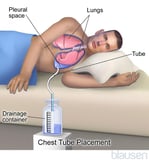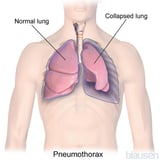What Type Of Blockage Causes Basal Atelectatic Changes
Atelectasis is a status in which all or role of a lung becomes airless and collapses.
-
Blockage of the bronchial tubes is a common crusade of atelectasis.
-
Shortness of breath can develop if oxygen levels are depression or pneumonia occurs.
-
Breast x-ray is used to confirm the diagnosis.
-
Treatment may involve making certain deep animate occurs, relieving airway blockages, or both.
The main function of the lungs is to blot oxygen into the bloodstream from the atmosphere and to miscarry carbon dioxide from the blood into the exhaled breath (gas exchange—run into figure Gas Commutation Between Alveolar Spaces and Capillaries Gas Exchange Betwixt Alveolar Spaces and Capillaries  ). For gas substitution to occur, the small air sacs within the lungs (alveoli) must remain open up and filled with air. Alveoli are kept open by the rubberband structure of the lung and by a liquid lining called surfactant. Surfactant counters the natural tendency of the alveoli to shut (collapse). Periodic deep breaths, which people take unconsciously, and coughing too help keep alveoli open. Cough expels whatever mucus or other secretions that could block the airways leading to the alveoli.
). For gas substitution to occur, the small air sacs within the lungs (alveoli) must remain open up and filled with air. Alveoli are kept open by the rubberband structure of the lung and by a liquid lining called surfactant. Surfactant counters the natural tendency of the alveoli to shut (collapse). Periodic deep breaths, which people take unconsciously, and coughing too help keep alveoli open. Cough expels whatever mucus or other secretions that could block the airways leading to the alveoli.
If the alveoli are closed for any reason, they cannot participate in gas exchange. The more alveoli that are airtight, the less gas exchange occurs. Accordingly, atelectasis can decrease the level of oxygen in the blood. The body compensates for a small-scale amount of atelectasis by closing off (constricting) the claret vessels in the affected area. This constriction redirects claret flow to alveoli that are open up and then that gas commutation tin can continue.
Common causes of atelectasis commonly involve i of the following
-
Blockage of one of the tubes (bronchi) that branch off from the trachea (windpipe) and lead to the lung tissue
-
Conditions that decrease deep breathing or suppress a person'south ability to cough
The blockage may be caused past something inside the bronchus, such as a plug of mucus, a tumor, or an inhaled foreign object (such as a pill, a piece of food, or a toy). Alternatively, the bronchus may be blocked past something pressing from the outside, such equally a tumor or an enlarged lymph node. Blockage from the exterior can besides occur if the pleural space (the space outside of the lung just inside of the chest) contains a large corporeality of fluid (pleural effusion Pleural Effusion Pleural effusion is the abnormal accumulation of fluid in the pleural space (the expanse betwixt the two layers of the thin membrane that covers the lungs). Fluid can accumulate in the pleural... read more  ) or air (pneumothorax Pneumothorax A pneumothorax is the presence of air between the two layers of pleura (sparse, transparent, two-layered membrane that covers the lungs and as well lines the inside of the breast wall), resulting... read more
) or air (pneumothorax Pneumothorax A pneumothorax is the presence of air between the two layers of pleura (sparse, transparent, two-layered membrane that covers the lungs and as well lines the inside of the breast wall), resulting... read more  ).
).
When a bronchus or a smaller airway (bronchiole) becomes blocked, the air in the alveoli beyond the blockage is absorbed into the bloodstream, causing the alveoli to shrink and collapse. The area of collapsed lung may become infected considering leaner and white blood cells can build upwards behind (to the inside of) the blockage. Infection is particularly probable if atelectasis persists for several days or more than. If atelectasis persists for months, the lung may non easily re-expand.
Certain neurologic weather, immobility, and chest deformities can limit chest movement and thus subtract deep breathing, as can intestinal swelling. People who are very overweight or obese are too at greater risk of developing atelectasis.
Atelectasis itself does not cause whatsoever symptoms except sometimes shortness of jiff. The presence and severity of shortness of breath depend on how rapidly atelectasis develops and how much of the lung is affected. If atelectasis involves a limited portion of the lung or develops slowly, symptoms may exist balmy or not even noticed. If a large number of alveoli are affected, particularly if atelectasis occurs rapidly, shortness of breath may exist astringent.
-
Breast x-ray
People who smoke can subtract their risk of atelectasis after surgery by stopping smoking Smoking Cessation While oftentimes very challenging, quitting smoking is one of the most of import things smokers can do for their wellness. Quitting smoking brings immediate health benefits that increase over time... read more , ideally six to 8 weeks earlier surgery. After surgery, people are encouraged to breathe deeply, cough regularly, and motion well-nigh every bit presently as possible. The apply of devices to encourage voluntary deep breathing, called incentive spirometry Breathing exercises Respiratory therapists use several dissimilar techniques to assist treat lung illness, including Postural drainage Suctioning Breathing exercises The choice of therapy is based on the underlying... read more than  , and certain exercises, including changing position to increment the drainage of lung fungus and other secretions, may help foreclose atelectasis.
, and certain exercises, including changing position to increment the drainage of lung fungus and other secretions, may help foreclose atelectasis.
Atelectasis may be prevented by making sure deep animate occurs. Whenever possible, conditions that cause shallow breathing for long periods should be treated.
-
Deep breathing and coughing
-
Relief of airway blockages by suctioning or bronchoscopy
Treatment of atelectasis may involve making sure deep breathing occurs, relieving airway blockages, or both.
Symptoms and complications of atelectasis may crave treatment. People may crave
-
Supplemental oxygen
-
Antibiotics, if bacterial infection is suspected
The following is an English-language resources that may be useful. Please notation that THE Transmission is not responsible for the content of this resources.
What Type Of Blockage Causes Basal Atelectatic Changes,
Source: https://www.msdmanuals.com/home/lung-and-airway-disorders/bronchiectasis-and-atelectasis/atelectasis
Posted by: williscappiket.blogspot.com


0 Response to "What Type Of Blockage Causes Basal Atelectatic Changes"
Post a Comment